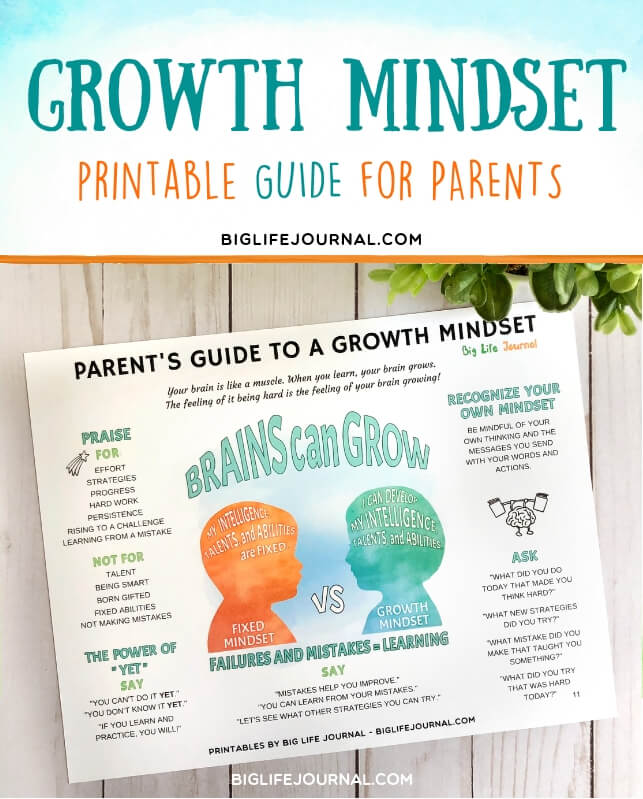4 Ways to Handle Fixed Mindset Adults In Your Kids’ Lives
THIS ARTICLE INCLUDES A FREE PRINTABLE
We know how crucial a growth mindset is to well-being and we work hard to instill that thinking in our kids. Naturally, we want everyone else around them to do the same!
What about all those other adults that influence our children? The ones who don’t believe that abilities can change and grow, or who fear making mistakes? What about those who aren’t even aware of this groundbreaking idea?
Before you move on, be sure to sign up for our FREE weekly printables carefully crafted to teach your children’s growth mindset, resilience, and much more. Sign up below to make sure you're on the list!
Once signed up, you will immediately receive our popular Parent's Guide to a Growth Mindset.


As we cultivate a growth mindset in our families, it’s helpful to recognize that not everyone will support (or understand) it. And that’s okay.
“Peace comes from realizing that this is your own journey.”
- Jen Harrison, Supporting Your Sensitive Child Founder
At the same time, partnering with key adults can make our teachings even more impactful. Here are 4 simple ways to tackle this potentially tricky situation, while strengthening your and your kids’ growth mindsets at the same time.

1. Start with Yourself
Discovered by researcher Dr. Carol Dweck, the theory of growth mindset has only been around a few decades. In a very real sense, this incredible concept is new to all of us.
Prior to Dweck’s bestseller Mindset: A New Psychology of Success in 2006, qualities like intelligence, talent and abilities were mainly considered unchangeable. Children were born “athletic” or good at math, and there was no way to develop those skills. These well-established ideas are still accepted by many.
Even for those of us familiar with (and practicing) growth mindset, it can still be a struggle at times. That’s because the fixed mindset is sneaky--commonly faced scenarios like dreading negative feedback from our boss or getting defensive about our mistakes reveal just how pervasive it can be.
Before you can address those other adults in your kid’s life, consider the following questions about yourself:
- What are my fixed mindset “triggers”? (issues or scenarios that elicit fixed mindset thinking)
- How do I currently monitor and overcome these triggers? Are there ways I could do it differently?
- What mistake did I make that taught me something?
- How can I create more learning experiences for myself?
fixed mindset thinking.
Our Growth Mindset Printables Kit contains valuable growth mindset handouts and guides for parents and teachers. These are a great way to explore a variety of topics and a better understanding of the growth mindset and how to weave the concepts into your family life or classrooms.

2. Share the Concept
Discussing the growth mindset with teachers, coaches and other adults in your child’s life is essential.
“We know that consistency is key for children’s emotional and mental well-being and development.”
- Jen Harrison, Supporting Your Sensitive Child Founder
Before tackling this important step, take a moment to reflect on how you’d like to present a growth mindset. Taking a positive and non-judgmental approach will help create a partnership, ensuring your message is well-received.
Harrison suggests the following:
- Share your excitement about learning a new mindset and the powerful effect it’s had on your child and family
- Ask if the adult (teacher/coach/babysitter) would be willing to use Growth Mindset language during the day or in the classroom and even display visuals
- Offer resources for getting started -- check out How to Explain Growth Mindset to Kids or How to Teach Growth Mindset to Kids (The 4-Week Guide) for ideas
- Discuss the Power of “Yet” (simply adding �?yet’ to any sentence creates a growth mindset statement: “I can’t do this...yet!”)

Also, consider examples of growth mindset that may be meaningful to them. Talking to a sports fan? Discuss how David Beckham practiced for thousands of hours as a child on his wall by moving farther and farther away from his goal as he improved. An avid reader? Share the story of JK Rowling’s many failures and rejections that led to her eventual (and huge) success.
For many other examples of a growth mindset in athletes, writers, musicians and more check out our Famous Failures Kit for Kids.


3. Clarify Misconceptions
As with any new theory, misunderstandings about growth mindset abound. Here are some common misconceptions, and conversation starters to overcome them:
Misconception #1: Results Don’t Matter
According to Dweck, this is the most prevalent misunderstanding about growth mindset. Many equate it with praising kids solely for effort, regardless of whether or not they’re learning. Adults unfamiliar with growth mindset may be (understandably) turned off by this idea.
In truth, growth mindset ties praise to success. As Dweck says, “The whole idea...is to focus on the learning process. When you focus on effort, you have to show how effort created learning progress or success.”
| Sample Conversation Starter: “Many people think that growth mindset means praising kids no matter how they’re doing. Actually, outcomes and results are really important. When a kid’s effort is unproductive or unsuccessful, growth mindset tells us to do something about it.” A discussion about improving problem-solving skills or helping your child set a realistic goal might follow. |
Misconception #2: You Either Have It or You Don’t
Growth mindset is a spectrum. Dweck states that “nobody has a growth mindset in everything all the time. Everyone is a mixture of fixed and growth mindsets.” A false growth mindset occurs when people believe they have one all the time.
| Sample Conversation Starter: “I recently read about something called a false growth mindset. I learned that mindset is a range, and even those of us who work hard at it have moments and challenges that trigger fixed mindsets. No one has a growth mindset all the time, and that’s to be expected. Our family practices every day to make ours stronger.” |
4. See the Possibilities
You’ve worked on your mindset. You’ve partnered with (and possibly educated) others. But some adults who model fixed mindset thinking remain in your child’s life. Rather than being discouraged or threatened by this, see it for the opportunity it is.
Here’s how you can use their thinking to deepen your kiddo’s positive mindset:
- Use fixed mindset comments as discussion starters (Did the teacher say she’s smart because she got an �?A’ on the test? Prompt her to identify other possible causes of her success--studying, persistence, or asking questions. Did a grandparent say no one in the family is good at math? Discuss how we know more now than ever before out how the brain learns from challenges!)
- Help your child cultivate empathy and understanding of those who think differently. Living with a fixed mindset doesn’t always feel good--we can have compassion for that.
- Find your growth mindset tribe (know that thousands of other families are working hard to instill growth mindset just like you--lean on them!
Finally, use this experience to shift your mindset about how others think.
“There are plenty of examples of people who once approached their job, their education, their beliefs about intelligence (including Carol Dweck) or their relationships in a fixed mindset way, only to realize that they could improve their approach and their outcomes by adopting a growth mindset.”
- Viv Thackray, Psychologist
Just because someone appears to hold a fixed mindset now doesn’t mean they always will. Cultivate your growth mindset towards those adults, knowing they may just not have theirs...yet!
